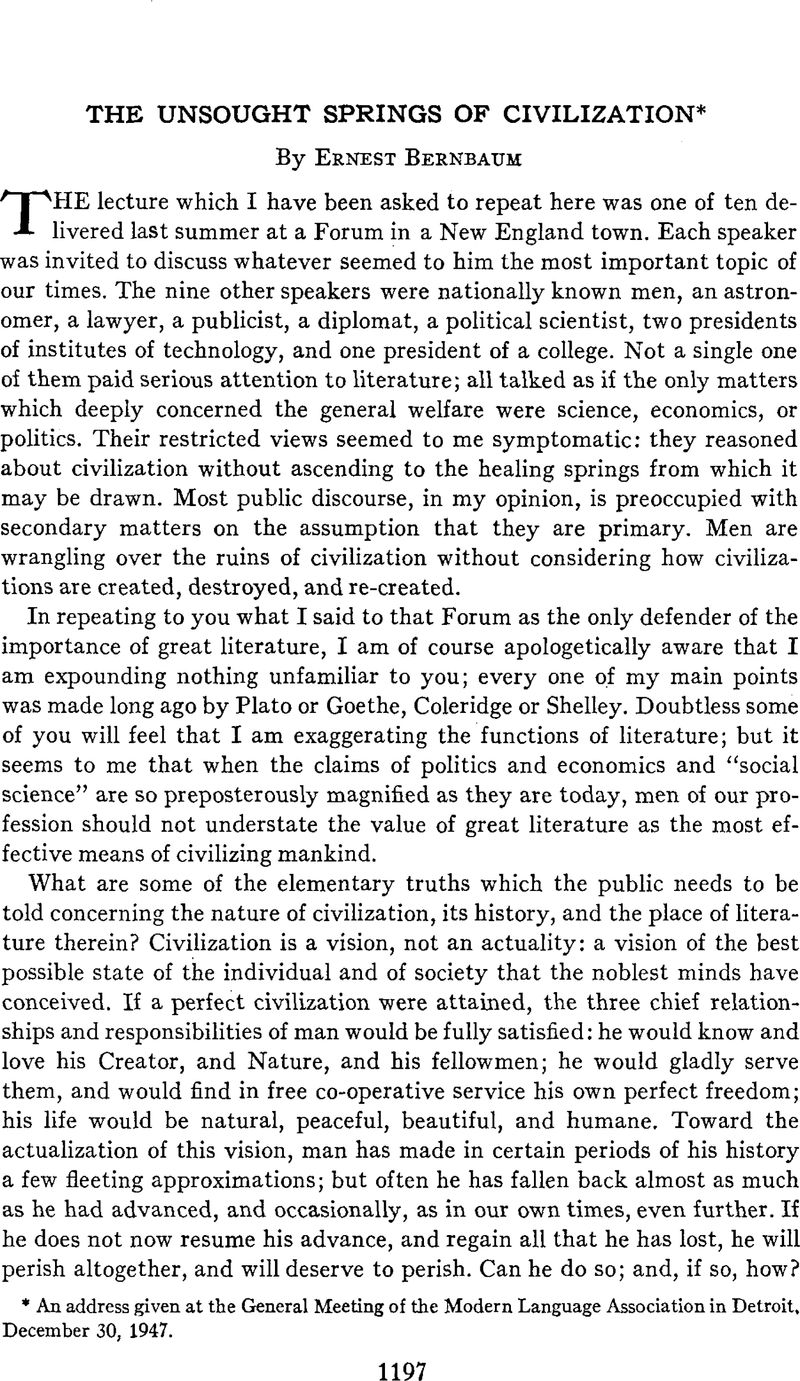No CrossRef data available.
Article contents
The Unsought Springs of Civilization
Published online by Cambridge University Press: 02 December 2020
Abstract
An abstract is not available for this content so a preview has been provided. Please use the Get access link above for information on how to access this content.

- Type
- Other
- Information
- Copyright
- Copyright © Modern Language Association of America, 1947
Footnotes
*
An address given at the General Meeting of the Modern Language Association in Detroit, December 30, 1947.
References
Collateral References
The student of literature will find it instructive to examine some of the better general histories, and to discover how little, if any, recognition they give to the function and power of imagination, of the arts, and of literature, in promoting civilization. Not only do the rationalists ignore that force—e.g., H. G. Wells, The Outline of History; Charles Richet, Allgemeine Kulturgeschichte; J. H. Robinson, The Mind in the Making; and Harry E. Barnes, New History—but it receives almost no acknowledgment in such otherwise admirable surveys as Francis Marvin's Living Past, Nicholas A. Weber's General History of the Christian Era, Hutton Webster's World History, and Geoffrey Parsons' Stream of History. H. A. L. Fisher's History of Europe makes much of the force of personality, but says next to nothing about the literary influences which molded or inspired it. A. J. Toynbee's Study of History stresses a) the success or failure of a civilization to meet a new challenge, and b) the temporary withdrawal of the leaders or prophets to gain insight; but it neglects the bearing of creative imagination upon each of those crucial situations. In his essay, “When Monsters Become Masters: Gods in Technology, Apes in Life” (Sat. Rev. Lit., Aug. 16, 1947), Toynbee shows that retrogressions have been due to the neglect of a humane tradition of a civilized past.Google Scholar
How futile the purely scientific approach may be, can be seen in Roger J. Williams' The Human Frontier (1946), which proposes a new applied science, “human-ics,” and in P. W. Bridgman's “New Vistas for Intelligence,” in Physical Science and Human Values (1947), which deplores the fact that reasoning scientists have not yet excogitated “new absolutes.”Google Scholar
More helpful are some of the approaches from a political standpoint, because they imply or expound the necessity of supporting democracy on ethical foundations—e.g., R. M. MacIver, The Web of Government (1946); W. E. Hocking, Freedom of the Press (1947); Hans J. Morgenthau, Scientific Man vs. Power Politics (1947); HansGoogle Scholar
Ornstein, Macht, Moral und Recht: Studien zur Grundproblematik menschlichen Zusammenlebens (Berne, 1946); and particularly John Bowle, Western Political Thought: From the Origins to Rousseau (1947).Google Scholar
On the religious aspect, see Geraint Vaughan Jones, Democracy and Civilization (1947); V. A. Demant, Theology of Society (1947); and especially Paul Roubiczek, The Misinterpretation of Man (1947). Yet none of these, nor older works of similar type, Shailer Matthews' Spiritual Interpretation of History and Robert McLaughlin's Spiritual Element in History, seem aware that neither religion nor reason is sufficiently effective without the aid of art and literature. Observe that in the American Scholar Forum (Autumn and Winter, 1947) on “The Humanities Today and Tomorrow,” out of thirteen contributions only two (Leo Spitzer's and Gordon Keith Chalmers') seem keenly aware of the need of a renaissance of literature in public regard.Google Scholar


